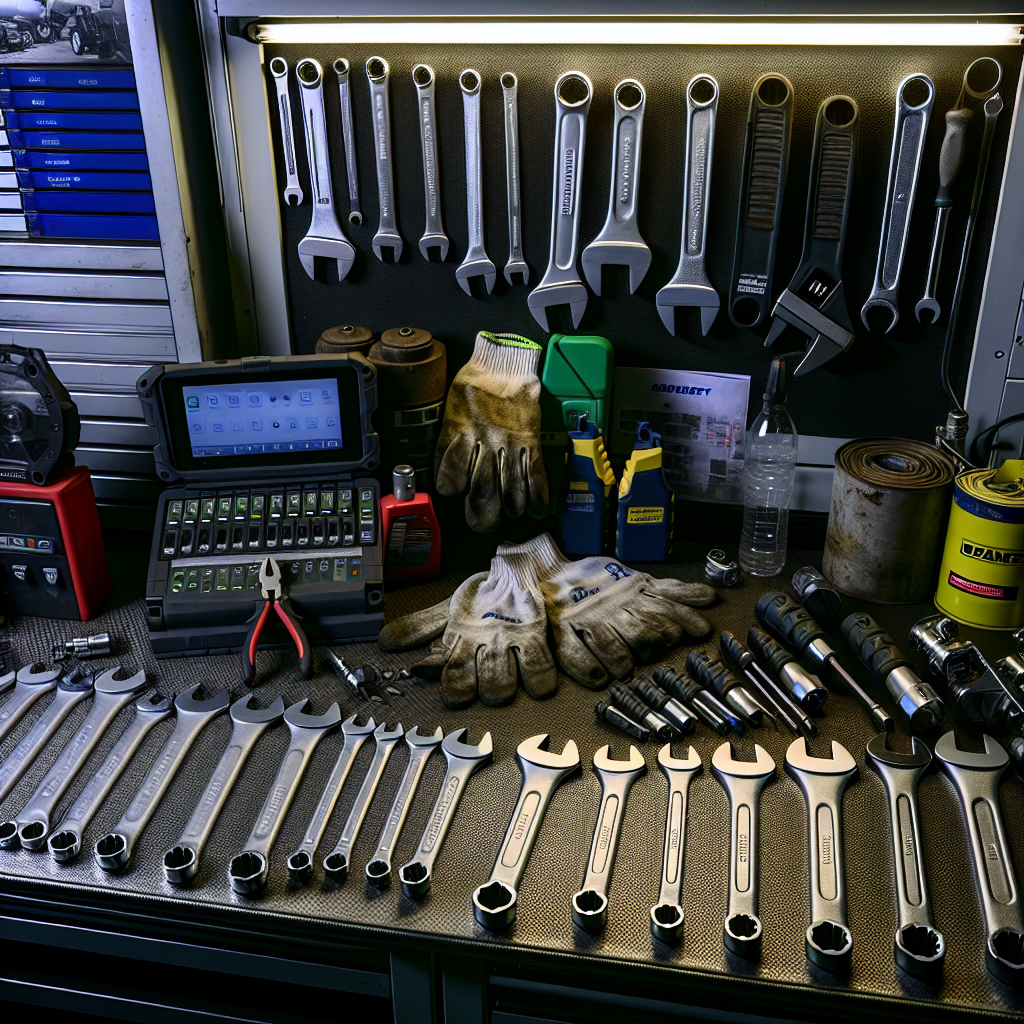Entering the world of diesel mechanics opens up a pathway to a rewarding and stable career that is in high demand. With the continuous growth of the transportation industry, skilled professionals who can maintain and repair diesel engines are becoming increasingly invaluable. Diesel mechanics enjoy job stability due to the essential nature of their work, as trucks and heavy machinery are crucial for commerce across the globe.
Moreover, this career boasts significant earning potential; starting salaries can range widely, with experienced ASE-certified technicians potentially earning up to $33.00 per hour. This guide aims to navigate aspiring diesel mechanics through the necessary steps to achieve not only certification but also a successful, fulfilling career in a field ripe with opportunities.
Whether you are drawn by the prospect of hands-on work, the technical challenges involved, or the chance to contribute to a vital industry, becoming a diesel mechanic could be your ticket to a prosperous future.
| Diesel Mechanic School | Duration | Tuition | Certifications Offered |
|---|---|---|---|
| WyoTech | 9 months | $31,750 | Snap-On 525F Multimeter, 608 EPA, 609 EPA, 5 ASE Student Certifications, Freightliner Get-Ahead, Kenworth Essentials Training |
| Dunwoody College of Technology | Information not available | Information not available | Information not available |
| New York Automotive and Diesel Institute | 15 months | $42,200 | Information not available |
| New England Institute of Technology | Information not available | Information not available | Information not available |
Career Opportunities for Diesel Mechanics
Diesel mechanics are at the forefront of maintaining and repairing diesel-powered vehicles and machinery, which are vital for sectors such as transportation, construction, and agriculture. As the demand for skilled technicians continues to rise, numerous career paths await those interested in this field.
Various Roles Available
In the diesel mechanic profession, individuals can pursue various roles, including:
- Entry-Level Technician: This role primarily focuses on routine maintenance tasks, assisting in basic repairs, and providing support to more experienced technicians.
- Senior Technician or Master Technician: Technicians in this position handle advanced diagnostics, complex repairs, and often take on leadership roles, training and mentoring junior staff.
- Diesel Engine Specialist: Some mechanics may choose to specialize in areas such as performance tuning and optimization of diesel engines, contributing to both efficiency and power enhancement.
- Fleet Manager: With experience, diesel mechanics can move into management roles overseeing repair shops or fleet operations, ensuring all vehicles operate safely and efficiently.
According to the U.S. Bureau of Labor Statistics, employment for diesel service technicians and mechanics is projected to grow by 2% from 2024 to 2034, resulting in approximately 26,500 job openings each year due to workforce turnover. [source] This growth emphasizes the evolution of the sector, as innovation in diesel technology continues to demand specialized skills.
Importance of ASE Certification
Earning Automotive Service Excellence (ASE) certification is crucial for those seeking to advance their careers. Benefits of obtaining this certification include:
- Better Job Prospects: Many employers actively seek ASE-certified mechanics, which enhances their employability. Obtaining the appropriate ASE certifications can specifically position diesel mechanics for specialized roles that require advanced knowledge, such as an Electronic Diesel Engine Diagnosis Specialist. [pocketprep.com]
- Higher Salaries: Typically, ASE-certified technicians earn between 15% and 30% more than their non-certified peers. For instance, ASE-certified diesel mechanics can expect an average salary ranging from $45,000 to $70,000 annually. [pocketprep.com]
- Professional Recognition: Certification showcases a commitment to the profession and provides assurance to employers and customers of the technician’s expertise. In many cases, employers offer bonuses ranging from $1,000 to $2,500 upon obtaining advanced ASE certifications, highlighting the tangible rewards of being recognized within the industry. [truetec-sa.com]
Job Stability
The job outlook for diesel mechanics is strong. According to the U.S. Bureau of Labor Statistics, employment for diesel service technicians and mechanics is projected to grow steadily, reflecting the ongoing requirement for diesel-powered vehicles and machinery across various industries. Positions in local government may also offer a median wage of $67,710, emphasizing the career’s stability and potential for lucrative earnings.
In conclusion, embarking on a career as a diesel mechanic offers numerous opportunities for growth and advancement. With the right qualifications, such as ASE certification, one can enjoy a lucrative salary and stable employment, making this field an appealing choice for individuals with a passion for mechanics and technology.

Benefits of ASE Certification
Obtaining an Automotive Service Excellence (ASE) certification offers a multitude of benefits for automotive and diesel technicians, significantly impacting their careers while enhancing personal development.
Job Advantages
- Enhanced Employability: ASE certification is highly respected within the automotive industry. Technicians with this certification gain a competitive edge in the job market, as employers view certified professionals as competent and reliable. According to Indeed, this certification often enables better job prospects.
- Access to Specialized Roles: Technicians can apply for specific positions that require specialized training or expertise in areas like diesel engines or electronic systems. This broadens the range of career options available and increases job security.
Potential Salary Increases
- Higher Earning Potential: Certified technicians typically enjoy higher salaries compared to their peers without certification. ASE-certified diesel mechanics can earn average salaries ranging from $45,000 to $70,000, while non-certified mechanics generally make between $30,000 and $50,000. This salary gap underscores the financial incentive to pursue certification.
- Negotiation Leverage: With ASE certification, technicians are often better positioned in salary negotiations. It showcases their commitment to professional excellence, which can lead to favorable compensation discussions.
Personal Development Aspects
- Skill Validation and Professional Growth: The journey to obtain ASE certification involves rigorous training and testing, ensuring technicians keep pace with industry trends and advancements. This commitment to continuous learning fosters personal growth and improves diagnostic and repair skills.
- Increased Customer Trust: Customers tend to show greater trust in ASE-certified technicians, knowing they have undergone extensive training and assessment. This trust leads to higher customer satisfaction and long-term relationships, benefiting technicians in their professional endeavors.
In conclusion, acquiring ASE certification is more than just a credential; it is a strategic investment in one’s career. Certified technicians not only experience enhanced job prospects and higher earnings but also attain personal growth and customer trust, which are invaluable in the evolving automotive industry.
Tooling Investments for Diesel Mechanics
Investing in tools is a significant part of becoming a successful diesel mechanic. The financial outlay is considerable, with a minimum investment of at least $30,000 necessary to equip oneself with essential tools and equipment. This amount encompasses a wide range of necessary items such as diagnostic tools, hand tools, specialized equipment, and safety gear. The right tools not only facilitate effective repairs and maintenance but also ensure that mechanics can operate at peak efficiency and comply with industry standards.
Breakdown of Tooling Costs
- Basic Hand Tools: Wrenches, sockets, screwdrivers, pliers, and other hand tools are foundational for any diesel mechanic. The cost can range from $3,000 to $5,000 depending on quality and brands.
- Diagnostic Equipment: Advanced diagnostic tools are critical for identifying issues in diesel engines. These can vary in cost from $2,000 to $10,000, with high-tech scanners often on the higher end.
- Specialized Tools: Depending on what kind of diesel engines a mechanic prefers to work on, additional specialized tools may be needed. These tools can account for another $5,000 to $10,000.
- Safety Gear: Personal protective equipment, including safety glasses, gloves, and boots, should also be considered, adding an estimated $500 to $1,500 to the initial costs.
Job Readiness and Future Earnings
Equipping oneself with the right tools not only prepares aspiring diesel mechanics for their immediate job responsibilities but also enhances their marketability for future employment opportunities. Employees equipped with proper tools demonstrate professionalism and readiness to tackle repairs without delay, which can lead to faster job placements and promotions.
Additionally, a solid investment in tooling can significantly impact earnings over time. Mechanics with better tools can perform more complex tasks efficiently, allowing them to charge higher rates for their work, thereby increasing their income potential. Subsequently, as they gain experience and build a loyal customer base, their earnings can potentially rise to $70,000 or more annually, further justifying the initial investment.
Conclusion
In summary, the financial commitment to tooling is not merely an expense; it is a strategic investment in future success. With a minimum investment of $30,000, diesel mechanics can arm themselves with the tools necessary for effective and efficient service, positioning themselves for rewarding and stable career pathways in the bustling transportation sector.

In conclusion, pursuing a career as a diesel mechanic presents a wealth of opportunities for those willing to invest in their education and tools. The journey begins with selecting an appropriate diesel mechanic school, where aspiring technicians can gain essential skills that are in high demand across various industries. Obtaining Automotive Service Excellence (ASE) certification is a vital step, as it not only enhances employability but also typically leads to higher salaries and greater professional recognition.
Additionally, while the initial tooling investments may appear substantial, often exceeding $30,000, they are crucial for effective service and can significantly boost future income potential. The career paths available in this field are diverse, ranging from entry-level technicians to specialized roles and management positions, with experienced mechanics enjoying earnings that can exceed $100,000 annually. Overall, the combination of job stability, financial rewards, and personal satisfaction makes becoming a diesel mechanic a rewarding and promising path.
For those with a passion for mechanics and technology, now is the ideal time to consider making this career choice and embarking on a fulfilling journey in the world of diesel mechanic jobs.
Insights from Industry Experts
Incorporating quotes from industry professionals provides valuable perspectives on the benefits and challenges of being a diesel mechanic. These insights can help aspiring technicians understand the realities of this rewarding career path.
Job Stability and Demand
“Diesel mechanics play a crucial role in maintaining and repairing diesel-powered vehicles and machinery. The demand for diesel mechanics is on the rise due to the increasing popularity of diesel engine vehicles and machinery.”
This statement is supported by data from the Bureau of Labor Statistics, indicating that employment for diesel mechanics is projected to grow by 8% from 2020 to 2030. This specialization may offer less competition compared to general mechanic positions.
Earning Potential
“Diesel mechanics often benefit from a comfortable salary and an array of employee benefits, including life insurance and tuition reimbursement. The average base salary for a diesel mechanic is $52,568 per year, and overtime pay can significantly enhance earnings during busy periods.”
This perspective underscores the financial advantages associated with the profession.
Tooling Investments
“Acquiring the proper tools is essential for diesel mechanics. Having the right tools for every job presents a common challenge, and investing in quality tools is critical for efficiency and safety.”
Industry experts remind prospective diesel mechanics that while the investment in tools may seem daunting, it is necessary for effective service and career advancement.
In summary, a career as a diesel mechanic offers promising job stability and earning potential. However, it requires significant investments in tools and ongoing education to keep up with technological advancements.
A Day in the Life of a Diesel Mechanic
A day in the life of a diesel mechanic often begins early in the morning. As John arrives at the shop, he checks the service schedule and gathers the necessary tools. His first job involves troubleshooting a truck that has been struggling to start. After some assessments, he discovers a wiring issue that requires attention. While fixing the problem, John recalls a similar case from a few weeks back, where patience and persistence led to a satisfying resolution.
Throughout the day, he tackles several different tasks, from routine maintenance on fleet vehicles to complex repairs on powerful diesel engines. While the physical demands of lifting heavy components and working in tight spaces can be exhausting, the satisfaction of solving intricate problems and getting vehicles back on the road keeps him motivated. By the end of the day, John reflects on the rewarding nature of his job—a blend of technical challenges and the gratitude of clients who rely on his expertise.
Take the First Step Toward Your Future
Are you ready to embark on a rewarding career as a diesel mechanic? The demand for skilled mechanics is at an all-time high, and the opportunities are endless. By attending a diesel mechanic school, you can gain the necessary skills and knowledge to excel in this lucrative field.
These schools offer comprehensive programs, hands-on training, and valuable certifications that will set you apart from the competition. Institutions like WyoTech and Dunwoody College of Technology provide tailored courses that cater to varying interests and career goals in diesel technology.
Explore Your Options
Now is the perfect time to explore the resources available to you. Visit the following links to learn more:
- Diesel Mechanic School Guide: How To Become A Diesel Mechanic – Ask The Trucker – This guide provides insights into selecting the right school and highlights the best-rated options in the industry.
By investing in your education today, you are not just enrolling in a program—you are setting the stage for a stable and prosperous future. Join the ranks of skilled diesel mechanics who are not only making a difference in the transportation industry but also enjoying the benefits of a fulfilling career.
Start your journey now! Explore diesel mechanic schools and take the first step toward your bright future.
The job outlook for diesel mechanics is strong. According to the U.S. Bureau of Labor Statistics, employment for diesel service technicians and mechanics is projected to grow steadily. This growth reflects the ongoing need for diesel-powered vehicles and machinery in many industries.
Local government positions may also offer a median wage of $67,710. This highlights the stability and potential for lucrative earnings in this career.

